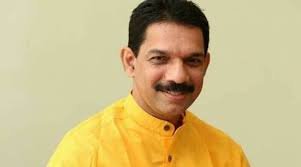In a recent development, Nalin Kumar Kateel, the Bharatiya Janata Party (BJP) President in Karnataka, has made alarming claims of “Talibanisation” taking root in the state. He suggested that the victory of the Indian National Congress in the Assembly polls has emboldened individuals engaged in “anti-national activities” who are now rising up to disrupt the peace and harmony in Karnataka. The remarks came in the wake of a tragic incident involving the killing of a BJP party worker. However, it is important to critically evaluate these statements and consider the broader political context surrounding them.
Nalin Kumar Kateel’s assertion of “Talibanisation” is a strong accusation, evoking imagery of extremism and fundamentalism. However, it is crucial to approach such claims with caution and skepticism, especially when they are made within a political context. The use of such terminology can often be politically motivated, aiming to influence public opinion and consolidate support for a particular party or ideology.
While the killing of a BJP party worker is undoubtedly tragic, it is important not to jump to conclusions about the motives behind the incident without a thorough investigation. It is premature and speculative to link this isolated incident to a larger phenomenon of “Talibanisation” in Karnataka. As responsible citizens, it is imperative that we allow law enforcement agencies to carry out a proper investigation to determine the facts and motives behind this unfortunate incident.
Political parties often employ rhetoric that stokes fear and division to advance their agendas. The use of terms like “anti-national activities” without specific evidence can be misleading and can contribute to an atmosphere of intolerance. It is crucial for political leaders to promote unity, understanding, and dialogue among diverse communities instead of resorting to inflammatory language that may further polarize society.
It is worth noting that the democratic process is the foundation of Indian society, and electoral victories are a reflection of the will of the people. The victory of the Indian National Congress in the Assembly polls signifies the choice made by the electorate. While political parties may have differing ideologies and priorities, it is essential to respect the democratic process and work towards constructive engagement for the betterment of the state.
Instead of resorting to accusations and inflammatory language, it is crucial for political leaders to focus on fostering a spirit of cooperation and collaboration. Building bridges between parties, communities, and individuals is necessary to address the challenges faced by the state. Constructive criticism and healthy political discourse can contribute to the development and progress of Karnataka.
Furthermore, it is vital for the media and the public to critically examine political statements, ensuring that they are based on evidence and promote inclusivity rather than division. Holding political leaders accountable for their words and actions is an integral part of a vibrant democracy.
In conclusion, Nalin Kumar Kateel’s claims of “Talibanisation” in Karnataka following the Congress victory in the Assembly polls should be approached with caution and skepticism. It is important not to make sweeping generalizations or jump to conclusions based on isolated incidents. Instead, fostering a spirit of cooperation, inclusivity, and constructive engagement is necessary for the progress and development of the state.







